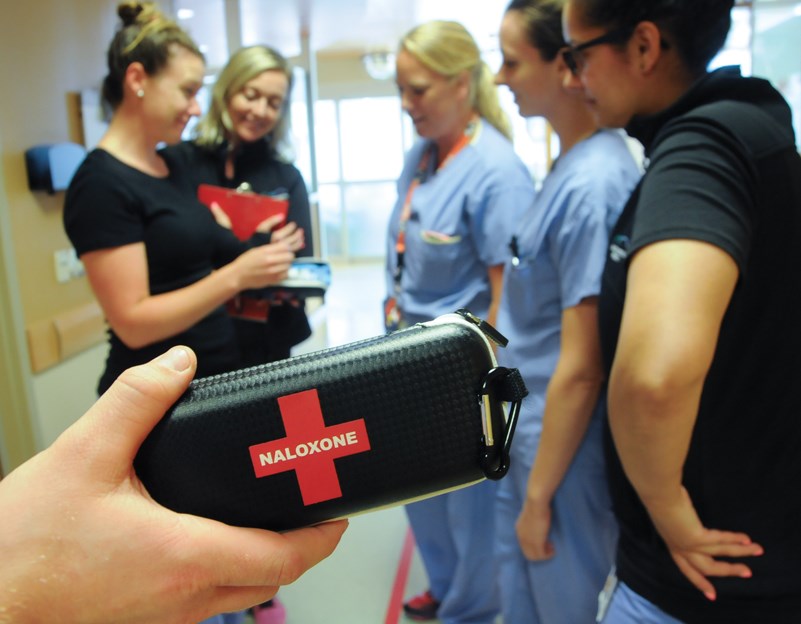In an effort to combat an overdose epidemic, staff in Lions Gate Hospital’s emergency department are now offering patients take-home naloxone kits.
The drug – which can stop an opiate overdose and revive a dying patient – is needed to counter a sharp uptick in the number of patients who wind up intubated in the hospital’s intensive care unit, according to Susanne Scott, a nurse at LGH.
“The amount of overdoses that we’re seeing is increasing significantly,” she said. “We’re offering these kits to users in order to save a life in the community.”
Rather than treating the overdose and discharging the patient, hospital staff are now offering instructions to both patients and their family members on the safe use of naloxone.
An opiate overdose usually involves an inability to wake, slowed pulse, shallow breathing and sometimes a blue or purple hue to the skin. The recommended treatment is to stimulate the patient, administer rescue breaths, and after calling 911 – inject naloxone in order to shield the patient’s brain receptors from the opioids.
In the event the patient isn’t suffering an opiate overdose, there’s still “no harm in administering the kit,” emphasizes Scott.
While many kits have been distributed, the plan is still sometimes hampered by the stigma associated with drug use, according to Scott.
“It’s difficult for (patients), there’s some shame with using (drugs),” she said.
There were 371 deaths to illicit drug overdoses in the first six months of 2016 in B.C. In 2012 – when fentanyl was much less common – there were 273 fatal overdoses in the entire year.
There have been nine fentanyl-related deaths on the North Shore since 2013, including two this year. That toll includes Lower Lonsdale parents Hardy and Amelia Leighton, 31 and 30, who died after likely snorting fentanyl-laced drugs in 2015.
Handing out the kits and offering training is a way of empowering patients, according to LGH nurse Michelle Connell.
“It’s a nice opportunity to do … harm reduction as opposed to being reactive,” she said.
Drug dealers are increasingly lacing and replacing heroin and oxycodone with fentanyl; a synthetic painkiller approximately 50 times as toxic as the street drugs for which it serves as a substitute, according to Vancouver Coastal Health.
In order to stem the rash of “senseless deaths,” Premier Christy Clark recently asked the federal government to restrict access to pill presses and to increase penalties on fentanyl importers.
A fentanyl shipment lighter than 30 grams can often avoid detection at Canada’s borders while producing fatal effects on the street.
The problem can also be augmented by chemists designing cutting-edge fentanyl compounds that don’t run afoul of the law, according to North Shore public health officer Dr. Mark Lysyshyn. “They’re so new that they’re not even incorporated into the Controlled Drugs and Substances Act,” he said.
The province is planning to offer 300 new beds at drug recovery centres by 2017, according to Clark.
“Rather than thinking about addiction as just a criminal issue, we’ve thought about it as a health issue,” she said, speaking at a press conference Thursday.
Safe injection sites are paramount in dealing with the overdose epidemic, said Clark, who credited the sites for helping connect drug users with medical help.
“Supervised injection sites have been a success in B.C. and they’ve saved a lot of lives,” she said.
Besides setting up a new joint task force on overdose response, the provincial government has funded specialized training for first responders dealing with fentanyl overdoses.
The College of Physicians and Surgeons of B.C. recently loosened the restriction on prescribing Suboxone, medication used to treat opioid addiction.
Naloxone kits are offered in North Vancouver at the Health Connection Clinic on 15th Street East and Central Community Health Centre on West Esplanade.



